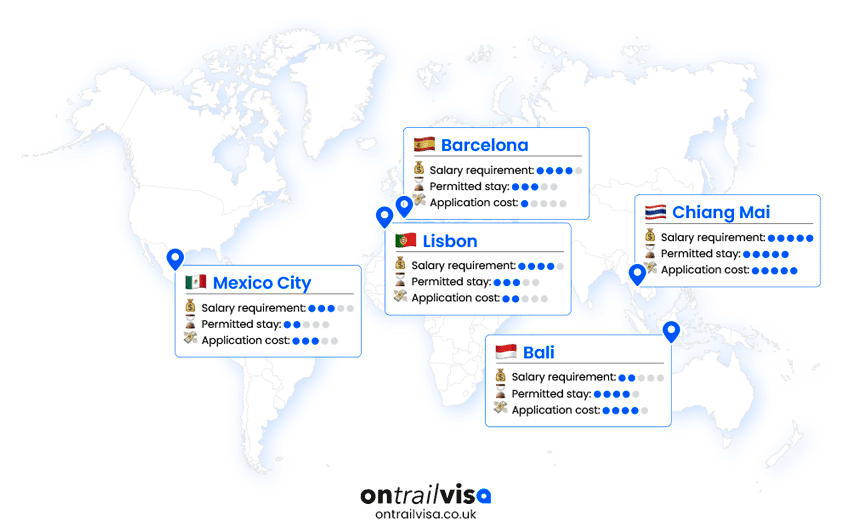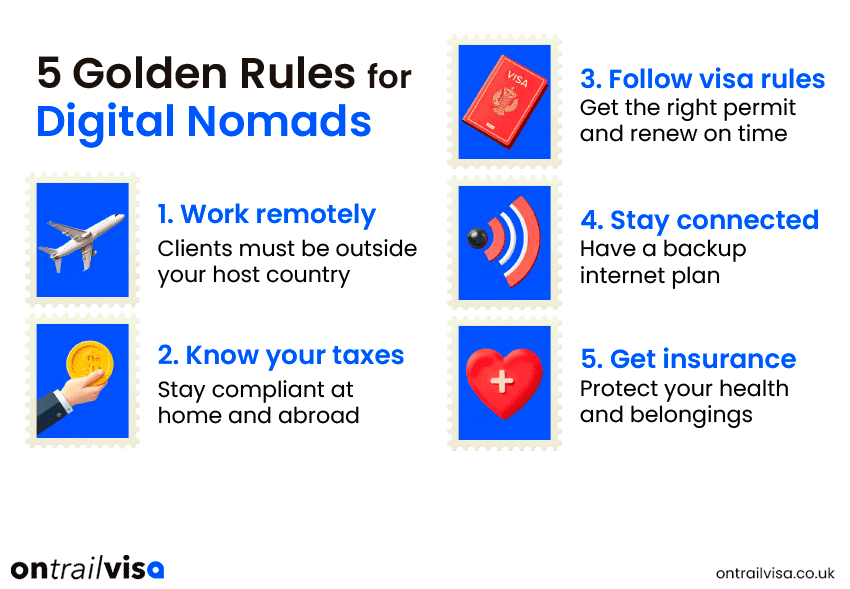Working remotely from anywhere in the world sounds great, but you need to do your homework before booking your flight. Since Brexit, the days of moving freely around Europe without a second thought are gone, but that doesn’t mean your digital nomad dreams are over.
From visa-free stays in Albania to Taiwan’s Employment Gold Card, there are plenty of options for UK remote workers, whatever your travel style. The key is knowing where you can work legally, how long you can stay, and whether your host country will expect a slice of your earnings.
Get it right, and you can enjoy travelling and working as you go, worry-free. Check out this detailed guide and start planning your first digital nomad destination.
What is a digital nomad visa?
A digital nomad visa is a type of permit designed specifically for remote workers, freelancers, and self-employed people. It permits you to legally keep up your work commitments while living temporarily in a foreign country.
Unlike standard visas issued for [holidays or business trips], digital nomad visas give you express permission to do paid work while visiting. Rules vary, but the golden rule is usually that your employer or clients must be based outside your destination country.
Why is it important to get a visa for remote work?
Getting the right visa when working remotely gives you the peace of mind of knowing you’re complying with local laws. Digital nomad visas grant you legal permission to keep earning as you travel and help you avoid complications with immigration authorities.
In most cases, your digital nomad visa also helps you sidestep local tax duties on your earnings while you’re a temporary resident. Depending on the conditions, you might also be able to access some services like a local during your stay.
What do I need to qualify for a digital work visa?
Most countries ask digital nomads to show proof of sufficient income. The minimum salary requirement varies greatly, from around £1,200 per month in Brazil, to more than £5,500 per month in Iceland.
Some countries also ask you to show proof of employment, like a job contract, or evidence that you’re working regularly for clients as a freelancer or contractor.
Other application rules differ from place to place, with some nations offering fast-track online applications and others making the process more complex and requesting an in-person visit to the embassy.
Many host countries also mandate that you take out health insurance to cover your entire stay. Even if this isn’t expressly required, it’s a good idea to arrange a comprehensive policy. No one wants their travel budget eaten up by hospital bills.
Who is eligible for a digital nomad visa?
Each country sets its own rules for issuing digital nomad visas. In most cases, the following professions are accepted as digital nomads:
- Remote employees
- Entrepreneurs and business owners
- Consultants, contractors, and freelancers
Though all countries have their own requirements, almost all remote work visas have conditions about who you work for during your stay. You’re almost always required to work for a business or clients based elsewhere.
This applies even if you’re your own boss. Keeping your tax responsibilities based outside your destination country means you can carry on working as normal, without having to comply with local employment and income rules.
Self-employed vs. employed remote workers
If you’ve found a host country that appeals, it’s vital to check whether your type of remote work fits with the local digital work visa policy. Some countries impose different rules for self-employed people and remote employees.
All applicants usually need to show evidence they have an ongoing income, but if you’re self-employed, you might also be asked to provide active client contracts or business registration paperwork.
Remote workers employed by a company often just need to show that they have a job contract that allows them to work online.
Post-Brexit rules for British digital nomads in the EU
Like many other travel rules, restrictions for remote workers with a UK passport have changed since Brexit came into effect. Formerly, Brits with digital roles could live and work indefinitely across the EU without getting a visa or permit.
These rights to freedom of movement were revoked for British citizens when the Withdrawal Agreement was finalised. Nonetheless, there are still ways to live and work remotely in certain EU countries.
Each country has its own rules, and there's no EU-wide policy for UK digital nomads since Brexit. Some nations, like Portugal, Estonia, Croatia, and Spain, have visas specifically dedicated to digital nomads, which are open to UK citizens.
To work in France or Germany, however, you’ll need to apply for a self-employed visa, provide your tax details, and show evidence you have active client contracts. 90/180-day rule for British remote workers
British citizens can currently stay in the Schengen Area for up to 90 days in a 180-day period without a visa or residence permit. The ETIAS travel authorisation, due to be launched in late 2026, will soon be needed but only involves a simple online application.
Many digital nomads use this 90/180 allowance to work remotely, but it’s important to note that this highlights a legal grey area.
Most Schengen countries do not explicitly permit any form of work for tourist stays. However, enforcement of these restrictions varies greatly, and remote workers can often go unnoticed, especially if you keep your head down.
Staying too long or publicly promoting your work could raise flags. If you’re planning to set up a long-term base in Europe, it’s always best to get the right permissions for your remote work according to the rules of your host country.
Easy-entry digital nomad destinations for UK citizens
More than 50 countries have remote work visas open to British passport holders. Some are quick to apply for, while others have stricter rules or higher income requirements.
If you’re looking for minimal entry criteria and a simple application process, the following destinations offer easy access for UK digital nomads:
-
Albania — Visa-free stay
- Remote work visa-free for 1 year
- No need to apply in advance
- No monthly income requirement
- Extend or apply for residency easily
-
Portugal — D8 visa
- D8 Visa grants up to 1 year’s stay
- £700/month salary requirement
- Renewable visa
- Path to long-term residency
-
Estonia — Digital Nomad Visa
- Stay for up to 1 year
- Grants legal work status
- 100% online application
- £3,000/month salary requirement
-
Georgia — Remotely from Georgia
- Visa-free for remote workers
- Stay for up to 12 months
- No application fee
- £1,600/month salary requirement
Popular remote work locations for Brits
Since telecommuting became part of the new normal, five top destinations have become remote work hotspots: Barcelona (Spain), Mexico City (Mexico), Lisbon (Portugal), Bali (Indonesia) and Chiang Mai (Thailand). Each has different criteria when it comes to factors such as how long you can stay, required proof of income and visa cost.

The hottest host cities for digital nomads also tend to have common characteristics, such as affordable cost of living, great weather, and a relaxed work-life balance. All of these factors help draw in remote workers looking for a high quality of life.
| Country | UK Citizens Eligible | Visa Duration | Renewable | Fee | Salary Requirement |
|---|---|---|---|---|---|
| Spain | ✅ | Up to 1 year | Yes (up to 5 years) | ~£67 (plus embassy costs) | ~£2,050/month |
| Mexico | ✅ | 1 year | Yes (up to 4 years) | ~£40 (visa) + ~£195 (residence card) | ~£2,050/month or ~£34,000 in savings |
| Portugal | ✅ | 1 year | Yes (up to 5 years) | ~£70 (visa) + ~£65 (residence permit) | ~£2,500/month |
| Indonesia | ✅ | Up to 1 year | Yes (for a 2nd year) | ~£230 | £46,000/year or £3,800/month |
| Thailand | ✅ | Up to 10 years | Yes (in 5-year blocks) | ~£475 | ~£63,000/year or ~£31,500/year with STEM degree |
You’ll also find reliable Wi-Fi and infrastructure for expats, with a community of international digital nomads that appeals to newcomers.
Where are the best places to work online?
NordLayer’s Global Remote Work Index in 2023 evaluated more than 100 countries to assess which were the best destinations for digital nomads, taking into account factors like cyber safety, economic security, and digital and physical infrastructure.
European nations Denmark, the Netherlands, and Germany topped the list, with Canada, the United States, and South Korea ranking between 10th and 20th place. Kayak’s Work from Wherever Index from 2022 also highlighted European nations as the best places to work remotely. Portugal, Spain, and Romania gained the top spots, scoring highly for social life, health and safety, and low local prices.
If you’re looking to go further afield, many countries continue to update their visa policies with digital nomads in mind. As of February 2025, Indonesia and Thailand, just a direct flight from London, have introduced dedicated visas for remote employees and digital freelancers.
To get the lowdown on what to expect, sites like The Earth Awaits give budget-based guidance on the host countries that provide the best quality of life, with details on healthcare, broadband speeds, crime rates, and pollution.
Can I do remote work without getting a digital nomad visa?
Digital nomad visas aren’t the only way to take your remote work abroad. Some countries allow visitors to keep up work commitments while visiting temporarily.
As of early 2025, New Zealand now allows UK visitors travelling with an NZ eTA to work online during their stay. You can stay for up to 6 months and work digitally, as long as your employer or clients aren’t local to New Zealand.
Similarly, if you’re travelling with an eVisitor visa for Australia, you can keep up remote work responsibilities, as long as this isn’t the main reason for your trip. You can stay for up to 3 months, but shouldn’t use the visa to relocate to Australia permanently.
When is it necessary to get a remote work visa?
All countries have different policies, with some imposing tougher rules than others. Kenya’s Electronic Travel Authorisation is strictly for tourist visitors, and digital workers must apply for a Class N Digital Nomad Permit in order to work during their trip.
While some countries turn a blind eye to short-term remote work, make sure to regulate your situation if you’re thinking of calling your next digital work destination a temporary home.

Do I pay UK tax as a digital nomad?
Double taxation could come as a nasty surprise if your host country requires you to pay income tax while you’re still being taxed in the UK, or wherever your earnings come from. However, many countries have mutual treaties to help prevent this.
To stay compliant, carefully check the local tax laws of your destination country and keep records of your stay. Asking a local tax specialist for advice is the best move. In some cases, you might be recommended to register as a tax resident.
Short remote work stays are unlikely to incur taxes or other penalties, but for longer trips, make sure to check the rules in your host country.
In some cases, it’s possible to make a border run, i.e., leave and reenter a country to skip visa or other issues that come with long stays. However, this can cause problems in the long term.
Every time you pass through immigration control, your data is recorded. If border officials have concerns about your travel history, or suspect you may be travelling in and out of the country to avoid tax or other duties, you could face penalties or be denied reentry.
Find your next remote work destination
Thanks to Brexit, being a digital nomad with a UK passport isn’t as easy as it once was, but it’s hardly a lost cause. With the right visa and a bit of planning, you can still take your laptop somewhere sunnier without breaking any rules.
Just remember to check the small print, sort your paperwork, and get on with living the dream! Looking for your next remote work destination? It’s always worth making a preliminary trip to explore and make sure it’s the right fit.
Get the travel documents you need with OnTrailVisa and check our destination guides on the requirements and conditions of international visas for UK citizens.
Showing 3 of 30 destinations Show more
OnTrailVisa makes working abroad simple. We offer clear, reliable visa guidance for UK travellers—so you can focus on your next destination, not the admin. Apply today and let our experts sort your travel documents, hassle-free.




